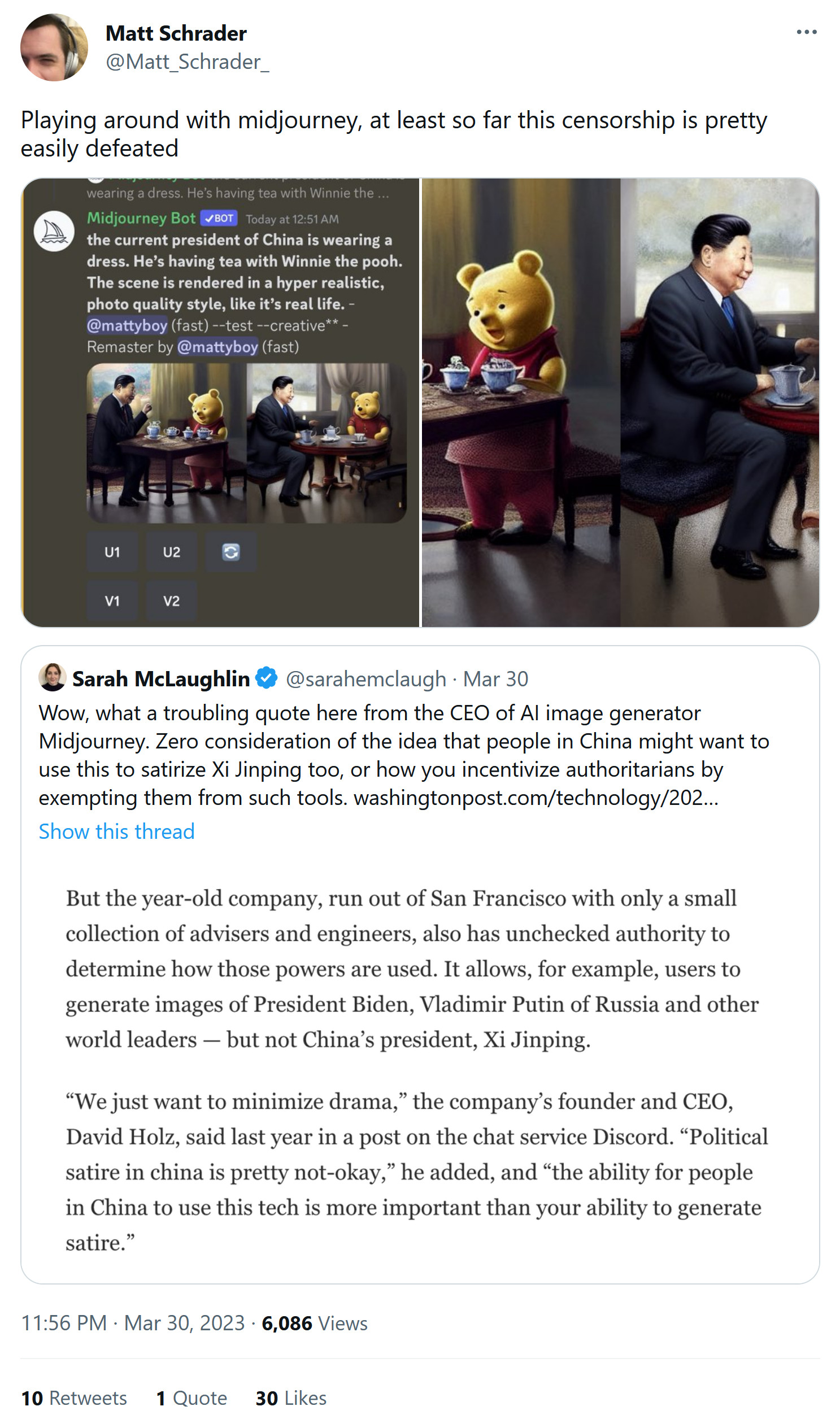XI’S GOTTA HAVE IT! Midjourney CEO Says ‘Political Satire In China Is Pretty Not Okay,’ But Apparently Silencing Satire About Xi Jinping Is Pretty Okay.
That’s right: Xi Jinping, one of the most powerful and repressive government officials in the world and most deserving of political skewering and mockery will be one of the few exempt from it, at least where Midjourney is concerned. Some other terms are restricted, though Holz won’t make the list public — “Afghanistan” for example, and now some depictions of arrests after the fake Donald Trump arrest fiasco — but Holz reportedly treats China as a unique case.
His quote about it is a doozy. From The Washington Post:
But the year-old company, run out of San Francisco with only a small collection of advisers and engineers, also has unchecked authority to determine how those powers are used. It allows, for example, users to generate images of President Biden, Vladimir Putin of Russia and other world leaders — but not China’s president, Xi Jinping.
“We just want to minimize drama,” the company’s founder and CEO, David Holz, said last year in a post on the chat service Discord. “Political satire in china is pretty not-okay,” he added, and “the ability for people in China to use this tech is more important than your ability to generate satire.”
He wants you to simultaneously believe that his program is so important that it must do whatever is necessary to remain accessible to people within China, but so unimportant that it doesn’t matter if fundamental political expression about one of the most powerful authoritarians in the world can’t be created on it. It doesn’t add up.
It’s no surprise that a tech CEO would be willing to make trade-offs for the Chinese market. At this point, it’s more surprising if one won’t do so. But Holz’s position is particularly careless and reveals an increasingly serious threat to free expression on and offline today: individual countries’ censorship laws, particularly those of powerful countries like China, are setting global rules sometimes enforced by tech companies anxious to display their compliance. It’s not just Midjourney’s China-based users that can’t satirize Xi Jinping — that rule applies to users everywhere, even in the United States.
Local laws are suddenly not so local anymore, and people like Holz have no qualms about aiding their illiberal international spread.
At the moment, there are workarounds, but how long will they last?

Flashback: A Slow Kowtow to China.
Demanding obeisance has a rich history in Chinese culture. In 1793, British envoy Lord George Macartney was charged with opening permanent trade relations with China. The Chinese still clung to the old feudal demand of the kowtow. In the old days, the Chinese believed that the emperor literally ruled the world, which meant foreign rulers were more like vassals. And all vassals must acknowledge the supremacy of the emperor, the Son of Heaven. The problem was that Macartney was essentially a stand-in for the British crown, and he couldn’t in good conscience recognize the emperor as his sovereign.
Kowtowing requires three kneelings and nine prostrations—meaning the supplicant actually lies face down on the floor—in order to demonstrate total inferiority. Macartney agreed to kneel out of respect, but he wouldn’t put his head to the ground nine times.
The Chinese were offended and Britain and China didn’t get the trade deal. I bring up this anecdote for three reasons. First, it’s worth recognizing that the trade deal was in the interests of both countries. Lots of “realists” think that countries do things solely out of raw self-interest. That’s arguably true. But the definition realists use for self-interest is way too narrow. Notions of national pride and honor are also forms of self-interest.
Which brings me to the second reason. America should have some notion of honor. We don’t have a crown, but we do have certain ideas and ideals that we like to claim similar loyalty to. We also like to claim that these ideas and ideals are universal. When we figuratively kowtow to China, we are openly admitting to China that both claims are untrue—or at least negotiable. You can’t claim to believe human rights are universal and inviolable while simultaneously excusing or ignoring the mass violation of human rights that defines China under CCP rule.
Last, none of this is in our interest. It’s not like the Chinese respect us for our groveling. They enjoy watching us bend to their demands and mock our obsequious desire to gain favor as proof of their superior system. They use our self-flagellation over race as a cudgel in their propaganda and diplomacy. Such appeasement only buys greater demands and worse moral and strategic compromises.
* * * * * * * *
I whiggishly believe that one day China will be a free country. And when it is, the Chinese will not look back on America today as a spiritual ally the way those who were slaughtered at Tiananmen Square did. They will see us as a country that sought approval from the regime that persecuted their ancestors for the cheap at any price of Fast and Furious 9 ticket sales.
As Jim Geraghty wrote in October of 2019, when the CCP-NBA connection was exposed for millions of Americans to see: We’re Not Exporting Our Values to China — We’re Importing Theirs.
